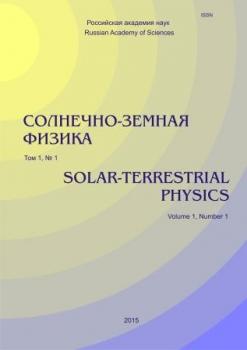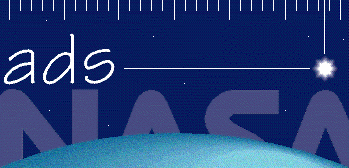from 01.01.1975 to 01.01.2021
Irkutsk, Irkutsk region, Russian Federation
Irkutsk, Russian Federation
Irkutsk, Russian Federation
Department of Space Science and Engineering, National Central University, Taiwan
Moscow, Russian Federation
Moscow, Russian Federation
Paratunka, Kamchatka, Russian Federation
Ulaanbaatar, Mongolia
Sodankyulya, Finland
UDC 53
We report the results of a study on the movement of the solar wind diamagnetic structure (DS), which is a sequence of smaller-scale microDS being part of the May 18, 2013 coronal mass ejection, from a source on the Sun to Earth’s surface. DS determined from the high negative correlation coefficient (r=–0.9) between the IMF modulus (B) and the SW density (N) on the ACE and Wind satellites at the L1 point, on the THB and THC satellites (r=–0.9) in near-Earth orbit, and on the THA satellite inside the magnetosphere is carried by the solar wind from the Sun to Earth’s orbit, while maintaining its fine internal structure. Having a large size in the radial direction (≈763 Rᴇ, where Rᴇ is the Earth radius), DS flows around the magnetosphere. At the same time, microDS of size ≤13 Rᴇ passes through the bow shock and magnetopause as a magnetized plasmoid in which the ion concentration increases from 10 cm⁻³ to 90 cm⁻³, and the velocity decreases as it moves toward the magnetotail. When a microDS passes through the magnetopause, a pulsed electric field of ~400 mV/m is generated with subsequent oscillations with a period of T~200 s and an amplitude of ~50 mV/m. The electric field accelerates charged particles of the radiation belt and produces modulated fluxes of protons in an energy range 95–575 keV on the day side and electrons in 40–475 keV and protons in 95–575 keV on the night side. In the duskside magnetosphere (19–23 MLT), the substorm activation is observed in geomagnetic pulsations and auroras, but without a magnetic negative bay. In the post-midnight sector (01–05 MLT), a sawtooth substorm occurs without the growth phase and breakup with deep modulation of the ionospheric current and auroral absorption. The duration of all phenomena in the magnetosphere and on Earth is determined by the period of interaction between DS and the magnetosphere (~4 hrs). To interpret the regularities of the magnetospheric response to the interaction with DS, we consider alternative models of the impulsive passage of DS from SW to the magnetosphere and the classical model of reconnection of IMF and the geomagnetic field.
diamagnetic structure, magnetized plasmoid, impulsive passage to the magnetosphere, sawtooth substorm
1. 1. Akasofu S.-I. Auroral substorms: search for processes causing the expansion phase in terms of the electric current approach. Space Sci Rev. 2017, vol. 212, pp. 341-381. DOI:https://doi.org/10.1007/s11214-017-0363-7.
2. Belakhovsky V., Pilipenko V., Engebretson M., Sakharov Y., Selivanov V. Impulsive disturbances of the geomagnetic field as a cause of induced currents of electric power lines. Journal of Space Weather and Space Climate. 2019, vol. 9, no. A18, pp. 2-19. DOI:https://doi.org/10.1051/swsc/2019015.
3. Dmitriev A.V., Suvorova A.V. Large-scale jets in the magnetosheath and plasma penetration across the magnetopause: THEMIS observations. J. Geophys. Res.: Space Phys. 2015, vol. 120, iss. 6. DOI:https://doi.org/10.1002/2014JA020953.
4. Echim M.M., Lemaire J.F. Laboratory and numerical simulations of the impulsive penetration mechanism. Space Sci. Rev. 2000, vol. 92, pp. 565-601.
5. Ermolaev Yu.I., Nikolaeva N.S., Lodkina I.G., Ermolaev M.Yu. Catalog of large-scale solar wind phenomena during 1976-2000. Cosmic Res. 2009, vol. 47, no. 2, pp. 81-94. DOI:https://doi.org/10.1134/S0010952509020014.
6. Eselevich M.V., Eselevich V.G. Sporadic plasma streams and their sources in the period of extraordinary solar activity from October 26 to November 6, 2003. Cosmic Res. 2004, vol. 42, no. 6, pp. 571-582. DOI:https://doi.org/10.1007/s10604-005-0004-x.
7. Eselevich M.V., Eselevich V.G. Fractal structure of the heliospheric plasma sheet in the Earth’s orbit. Geomagnetism and Aeronomy. 2005, vol. 45, no. 3, pp. 326-336.
8. Gjerloev J.W. The SuperMAG data processing technique, J. Geophys. Res. 2012, vol. 117, A09213. DOI: 10.1029/ 2012JA017683.
9. Guglielmi A.V. MGD volni v okolozemnoi plazme [MHD Wave in Near Earth Plasma]. Moscow, Nauka Publ, 1979, p. 70. (In Russian).
10. Gunell H., Nilsson H., Stenberg G., Hamrin M., Karlsson T., Maggiolo R., André M., Lundin R., Dandouras I. Plasma penetration of the dayside magnetopause. Phys. Plasmas. 2012, vol. 19, no. 7, 072906. DOI:https://doi.org/10.1063/1.4739446.
11. Hess W.N. Radiatsionnyi poyas i magnitosphera [ The Radiation Belts and Magnetosphere]. Moscow, Mir Publ., 1968, 352 p. (In Russian).
12. Heikkila W.J. Initial condition for plasma transfer events. Earth's Low-Latitude Boundary Layer. Ed. by P.T. Newell, T. Onsager. Washington, AGU, 2003, pp. 157-168. (Geophysical Monograph Ser. Vol. 113). DOI:https://doi.org/10.1029/133gm16.
13. Hsu T.-S., Tung-Shin, McPherron R.L. An evaluation of the statistical signatures of the association between northward turnings of the interplanetary magnetic field and substorm expansion onset. J. Geophys. Res: Space Phys. 2002, vol. 107, no. A11, 1389. DOI:https://doi.org/10.1029/2000JA000125.
14. Keika K., Nakamura R., Baumjohann W., Angelopoulos V., Chi P.J., H.Glassmeier K., Fillingim M., Magnes W., Auster H.U., Fornaçon K.H., Reeves G.D., Yumoto K., Lucek E.A., Carr C.M., Dandouras I. Substorm expansion triggered by a sudden impulse front propagating from the dayside Magnetopause. J. Geophys. Res: Space Phys. 2009, vol. 114, iss. A1. DOI:https://doi.org/10.1029/2008JA013445.
15. Kessel R.L., Mann I.R., Fung S.F., Milling D.K., O’Connell N. Correlation of Pc5 wave power inside the magnetosphere during high speed streams. Ann. Geophys. 2004, vol. 22, pp. 629-641. DOI:https://doi.org/10.5194/angeo-22-629-2004.
16. Klibanova Yu.Yu., Mishin V.V. Tsegmed B., Moiseev A.V. Properties of Daytime Long-Period Pulsations during Magnetospheric Storm Commencement. ISSN 0016-7932, Geomagnetism and Aeronomy. 2016, vol. 56, no. 4, pp. 426-440. DOI:https://doi.org/10.1134/S0016793216040071.
17. Kokubun S., McPherron R., Russel C. Triggering of Substorms by Solar Wind Discontinuities. J. Geophys. Res. 1977, vol. 82, no. 1, pp. 74-86. DOI:https://doi.org/10.1029/JA082i001p00074.
18. Koskinen H.E.J., Lopez R.E., Pulkkinen R.I., Baker D.N., Bosinger T. Pseudobreakup and substorm growth phase in the ionosphere and magnetosphere. J. Geophys. Res. 1993. vol. 98, p. 5801-5814. DOI:https://doi.org/10.1029/92JA02482.
19. Lemaire J. Impulsive penetration of filamentary plasma elements into themagnetospheres of the Earth and Jupiter. Planet. Space Sci. 1977, vol. 25, pp. 887-890. DOI:https://doi.org/10.1016/0032-0633(77)90042-3.
20. Lemaire J. Plasmoid motion across a tangential discontinuity (with application to the magnetopause). J. Plasma Phys. 1985, vol. 33, no. 3, pp. 425-436.
21. Liou K., Newell P.T., Meng C.-I., Wu C.-C., Lepping P. Investigation of external triggering of substorms with Polar ultraviolet imager observations. J. Geophys. Res. 2003, vol. 108, no. A10, 1364. DOI:https://doi.org/10.1029/2003JA009984.
22. Maynard N.C., Farrugia C.J., Ober D.M., Burke W.J., Dunlop M., Mozer F.S., et al. Cluster observations of fast shocks in the magnetosheath launched as a tangential discon-tinuity with a pressure increase crossed the bow shock. J. Geophys. Res. 2008, vol. 113, A10212. DOI:https://doi.org/10.1029/2008JA013121.
23. Meurant M., Gerard J.C., Blockx C., Coumans V., Hubert B., Connors M., Lyons L.R., Donovan E. Comparison of intense nightside shock-induced precipitation and substorm activity. J. Geophys. Res. 2005, vol. 110, A07228. DOI:https://doi.org/10.1029/2004JA 010916.
24. Mishin V.V., Tsegmed B., Klibanova Y.Y., Kurikalova M.A. Burst geomagnetic pulsations as indicators of substorm expansion onsets during storms. J. Geophys. Res.: Space Phys. 2020, vol. 125, iss. 10, e2020JA028521. DOI:https://doi.org/10.1029/2020JA028521.
25. Mishin V.V. On the wave energy flux to the magnetosphere under the action of solar wind pressure pulsations. Issledovaniya po geomagnetizmu, aeronomii i fizike Solntsa [Research on Geomagnetism, Aeronomy and Solar Physics]. Novosibirsk, Nauka Publ., 1996, iss. 104, pp. 182-185. (In Russian).
26. Parkhomov V.A., Borodkova N.L., Eselevich V.G., Eselevich M.V., Dmitriev A.V., Chilikin V.E. Features of the impact of the solar wind diamagnetic structure on Earth’s magnetosphere. Solar-Terr. Phys. 2017, vol. 3, iss. 4, pp.44-57. DOI:https://doi.org/10.12737/stp-34201705.
27. Parkhomov V.A., Borodkova N.L., Eselevich V.G., Eselevich M.V., Dmitriev A.V., Chilikin V.E. Solar wind diamagnetic structures as a source of substorm - like disturbances. J. Atmos. Solar-Terr. Phys. 2018, vol. 181, pp.55-67. DOI:https://doi.org/10.1016/j.jastp.2018.10.010.
28. Parkhomov V.A., Eselevich V.G., Eselevich M.V, Dmitriev A.V., Suvorova A.V., Vedernikova T.I. Classi-fication of magnetospheric responces to interaction with dia-magnetic structures of slow solar wind. Solar-Terr. Phys. 2020, vol. 6, iss. 4, pp. 24-36. DOI:https://doi.org/10.12737/stp-64202004.
29. Potapov A.S., Polyushkina T.N. Experimental evidence for direct penetration of ULF waves from the solar wind and their possible effect on acceleration of radiation belt electrons. Geomagnetism and Aeronomy. 2010. Vol. 50, no. 8. P. 950-957. DOI:https://doi.org/10.1134/S0016793210080049
30. Rakhmanova L.S., Riazantseva M.O., Zastenker G.N. Solar-wind structure propagation through the magnetosheath studied by two Themis probes. Cosmic Res. 2015, vol. 53, no. 5, pp. 331-340. DOI:https://doi.org/10.1134/S0010952515040073.
31. Schwenn R., Dal Lago A., Huttunen E., Gonzalez W.D. The association of coronal mass ejections with their effects near the Earth. Ann. Geophys. 2005, vol. 23, pp. 1033-1059. DOI:https://doi.org/10.5194/angeo-23-1033-2005.
32. Shadrina L.P., Starodubtsev S.A. Manifestation of interplanetary schock in the geomagnetic storms and substorms. Physics of Auroral Phenomena. Proc. XXXIX Annual Seminar. Apatity, 2016, pp. 23-26. DOI:https://doi.org/10.22323/1.236.0111.
33. Troshichev O.A., Stauning P., Liou K., Reeves G. Saw-tooth substorms: Inconsistency of repetitive bay-like magnetic disturbances with behavior of aurora. Adv. Space Res. 2011, vol. 47, pp. 702-709. DOI:https://doi.org/10.1016/j.asr.2010.09.026.
34. Voitcu G., Echim M. Transport and entry of plasma clouds/jets across transverse magnetic discontinuities: three-dimensional electromagnetic particle-in-cell simulations. J. Geophys. Res.: Space Phys. 2016, vol. 121, pp. 4343-4361. DOI:https://doi.org/10.1002/2015JA021973.
35. Yahnin A.G., Sergeev V.A., Bösinger T., Sergienko T.I., Kornilov I.A., Borodkova N.L., Thomsen M.F., Belian R.D., Sauvaud J.-A., Lutsenko V.N., Skalsky A.A. Correlated Interball/ground-based observations of isolated substorm. Ann. Geophys. 2001, vol. 19, rr. 687-698. DOI:https://doi.org/10.5194/angeo-19-687-2001.
36. URL: https://cdaw.gsfc.nasa.gov/CME_list/catalog_ description.htm (accessed November 20, 2020).
37. URL: https://satdat.ngdc.noaa.gov/sem/goes/data/new_avg (accessed November 20, 2020).
38. URL: http://cdaweb.gsfc.nasa.gov/cgi-bin/eval2.cgi (accessed November 20, 2020).
39. URL: http://www.obsebre.es/en/rapid (accessed November 20, 2020).
40. URL: http://supermag.jhuapl.edu/mag (accessed November 20, 2020).
41. URL: http://carisma.ca/carisma-data/fgm-pi2-dbase (accessed November 20, 2020).
42. URL: www.intermagnet.org (accessed November 20, 2020).
43. URL: https://cdaweb.sci.gsfc.nasa.gov/cdaweb/istp_public (accessed November 20, 2020).
44. URL: https://www.sgo.fi/Data/Riometer/rioData.php (accessed November 20, 2020).


















